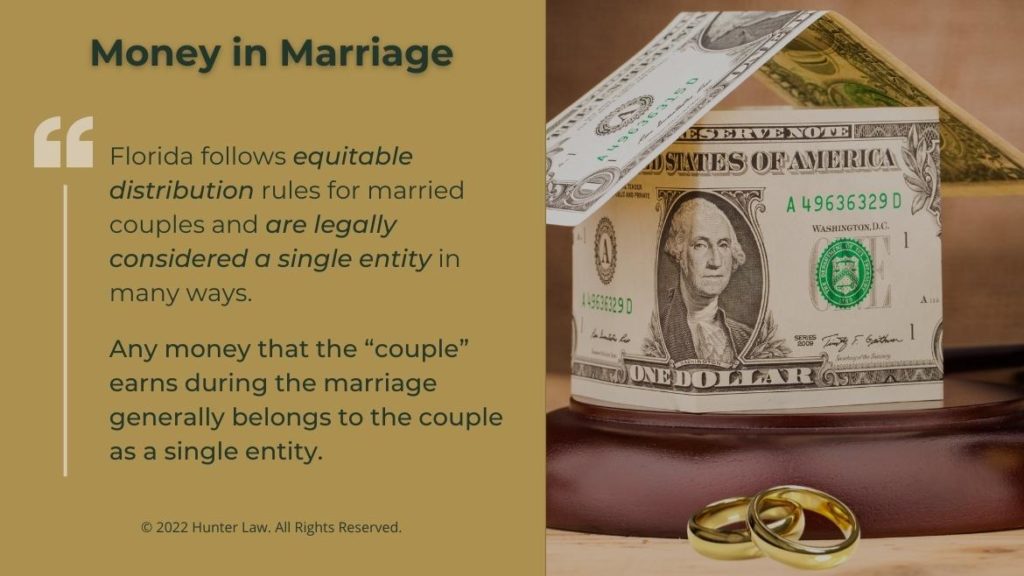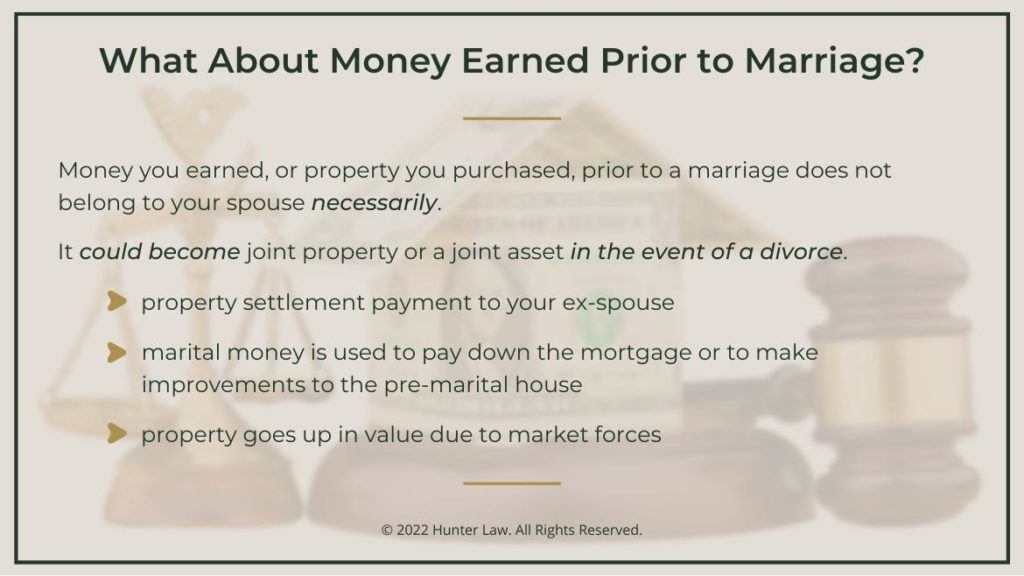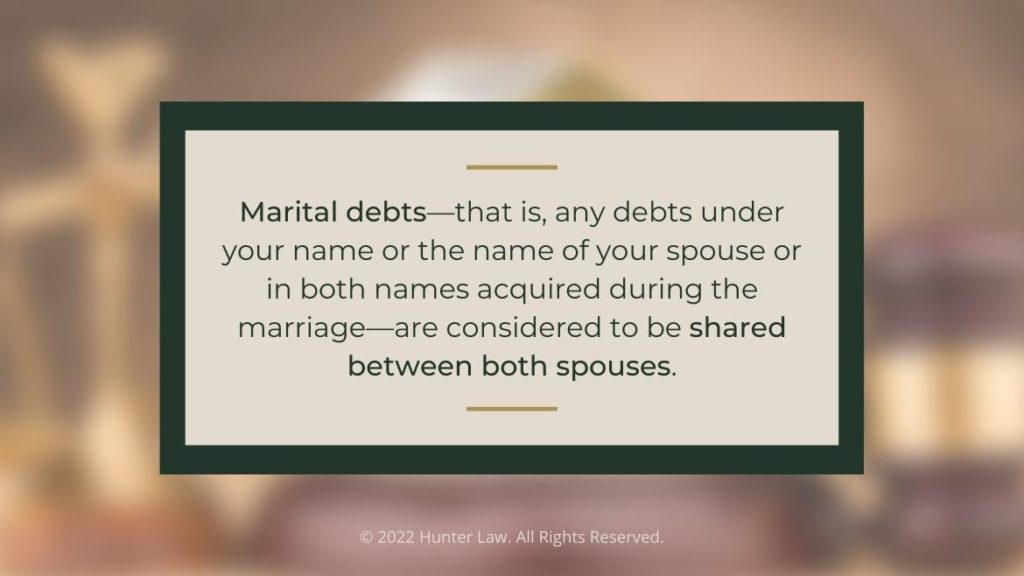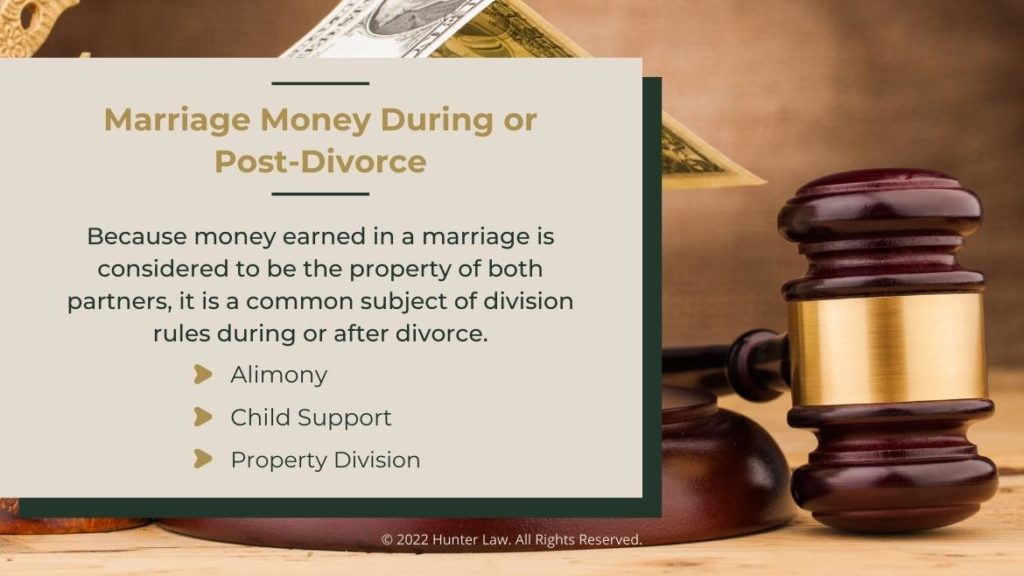When you marry in Florida, you join your life with another person in more ways than one. Not only can you now share and jointly own property, but you have access to and rights to information about each other’s finances. For some couples, this isn’t a problem. For others, it may introduce complexities or hard questions, especially if divorce is a possibility. Read on for more information about financial rights and obligations in marriage.
Money in Marriage
Florida follows equitable distribution rules for married couples. Generally, money brought into a marriage is shared between both spouses.
Because married couples are legally considered a single entity in many ways (such as for owning property or filing taxes), any money that the “couple” earns during the marriage generally belongs to the couple as a single entity, not the individuals within the partnership.
For example, if you earn a paycheck after getting married, the money that shows up in your bank account belongs to both you and your spouse. While your spouse may not have access to the bank account for a variety of reasons, they may have a legal right to it if they request it.
Note that this same philosophy applies to other property you begin to own or purchase while in a marriage. If you buy a house with your spouse, the house legally belongs to both of you unless you specifically sign a contract outlining more limited ownership rights (and exclude your spouse from ownership).
What About Money Earned Prior to Marriage?
Money that you earned prior to a marriage does not belong to your spouse necessarily. That said, the money could become joint property or a joint asset in the event of a divorce.
For instance, you may be required to make a property settlement payment to your ex-spouse due to a Tampa court order. You don’t have enough in cash you earned while in the marriage to cover the mandated amount. In such a case, you could be ordered to pay your spouse with money you had prior to the marriage.
Again, this principle applies to the property you purchase or own prior to marriage. If you buy a house before getting married, you own the house and not your spouse.
But if during the marriage, you use marital money to pay down the mortgage or use marital money to make improvements to the pre-marital house, or the rental house itself goes up in value due to market forces, the spouse could get an interest in at least some of the ownership of the house unless stated otherwise in a prenuptial agreement. Your Tampa divorce lawyer may help you navigate this complex process.
Considering a Prenup? Everything You Need to Know About Prenuptial Agreements
Income from Separate Properties
Technically, you can own separate property, such as a rental house or another source of real estate-related income. If you acquire that property using non-marital funds, such as an inheritance or a gift made to you by someone other than your spouse, it may be considered separate property.
In such cases, any income from that separate property is yours alone. But as soon as the income is commingled with marital money, it may be counted as shared property in divorce proceedings.
For example, if you own a rental property prior to meeting your current spouse, and you earn rental income from that property, the money is yours through the duration of your marriage unless you mix it with other marital money (like depositing it to a joint account, or using it buy other property with your spouse, or using it to pay down marital debts).
And, if you use marital money to maintain the non-marital rental property, pay down its mortgage, or improve the rental, your spouse may acquire a marital ownership interest, even if the non-marital rental property remains solely in your name.
Marital Debts
Like other assets and property, marital debts – that is, any debts under your name or the name of your spouse or in both names acquired during the marriage – are considered to be shared between both spouses.
If you or your spouse ran up a $10,000 debt to a credit card company during the marriage, that is a marital debt. Marital debts may impact your financial decisions or who is awarded what money during divorce proceedings, if applicable.
Prenuptial Agreements
Prenuptial agreements are legal contracts that limit financial liability or ownership between one or both parties in an upcoming marriage.
For instance, you may draw up a prenuptial agreement between you and your spouse prior to marriage with the assistance of a Tampa family law lawyer. The prenuptial agreement could state that:
- Any property you own prior to the marriage is yours alone and cannot be split with your spouse in the event of a divorce, including inheritance assets, money, etc.
- Any money you earn specifically is yours and not your spouse’s
- Etc.
The purpose of a prenuptial agreement is to protect the finances and property of both parties before they get married. That way, if they get divorced, both parties can walk away without having to go through the messy property division process.
How To Cope and Legally Prepare When a Marriage Is Over in Tampa, FL
Marriage Money During or Post-Divorce
Because money earned in a marriage is considered to be the property of both partners, it is a common subject of division rules during or after divorce. Understanding your financial rights and obligations in marriage becomes essential with the topic of divorce.
Alimony, Child Support, and Property Division
For example, you are legally obligated to count the money you earn to determine your ability to pay alimony or child support. Any money you earn post-divorce may also be counted for those purposes.
Similarly, income-generating property or assets, such as stocks and bonds, will be counted as income for determining your ability to pay alimony or child support. Your Tampa, Florida court may order that your assets, both financial and otherwise, be split with your spouse under the rules of equitable distribution.
In most cases, “equitable” distribution means that spouses split their property “50-50,” or equally. But equitable really means ‘fair” and Florida family law courts are “courts of equity.” So, a Tampa, Florida court may order an “unequal distribution” in order to “do equity” between the parties. Your finances may be used to balance or equalize the property your spouse receives if it is impractical for existing property to be split (i.e., you jointly own a single house and can’t literally split it down the middle).
Contact Tampa Family Law Lawyers Today
Understanding your financial rights and obligations in a marriage is difficult enough. It can become even tougher if you’re planning on divorcing your current partner and you want to know what you owe and what you can rely on as legally yours.
Knowledgeable family law lawyers in Tampa can help. As experienced legal professionals in this area, Hunter Law Group is well equipped and ready to help with arranging a prenuptial agreement, explaining your financial rights and obligations in marriage, or assisting with your divorce. Contact us today.







